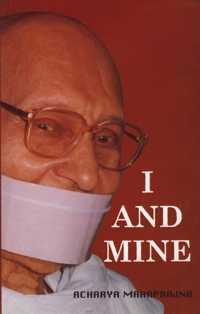
The most primary value of life is mental peace. One should think about the peace of mind in a natural but total manner. That which is done after planning is not very good. That which comes out spontaneously is natural. That which happens as a result of the application of the intellect is not natural. The tree and the pitcher are transient because they are made or created. But space is perennial because it is not made or created. The value of that which is made is not permanent. That which is accomplished naturally is good.
I have determined sixteen brief rules for attaining the peace of mind. Initially I did not think they had any sequential order. But it appears now that they do have it. They body and the mind are intimately related. The mind is intimately related with the senses also. Regulating them is also very essential. A Yoga scholar says:

By dedicated practice let us transform our senses so that they are neither dead nor alive, neither asleep nor awake. No dead, because they retain the capacity to sense the environment. Not alive, because they do not retain sensuality. Not asleep, because in eschewing sensuality there is no helplessness as in sleep. Not alive, because they are not inclined towards sensual pleasure.
Between the senses and the soul is the mind. When the mind is externally oriented, the senses become tuned to the outside world, and when it is internally oriented, they get tuned to the inner world. Since the mind is affected by external conflicts we have deliberated on them too.
What is there that does not affect the mind? The solar universe, the world of vegetation, the world of being and the world of atoms - all of them affect the mind. The learned teachers of Yoga have made a deep investigation of these matters.
The mind is related to external sights, both pleasant and unpleasant. I have my eyes open, but they are not fixed on or directed at any thing. Yet the fact is that countless atoms are passing by and are being touched by the eyes. An American woman photographed the light atoms. Keeping in mind the effect of the atoms on me I cannot easily say that I am thinking independently. Every man is affected by external circumstances and factors. Today no being either on the earth or in the atmosphere is fully independent. It will be the height of ignorance to support absolutism since every single thought is the product of innumerable factors.
Our viewpoint should be relative or qualified. There are many considerations behind every thought. A relative or qualified view strengthens our peace of mind. On the other hand, a one-sided or absolutist view gives birth to mental unrest.
During the past three weeks, you listened to me, Jainendraji and Dada Dharmadhikari. Sometimes it appeared that we were drifting apart; at other times it appeared that we were getting closer to one another. Sometimes we appeared to be holding opposite views and at other times we seemed to be talking the same thing.
There are countless ways in the world. Man, therefore, loses his way and does not know which way to go. Who should he listen to and whom should he believe? He is unable to decide. One man's views strike as right at one time, but they appear to be wrong when counter-arguments are given by another man. It is anybody's guess how many webs of arguments and ideologies there are.
Take the Mahabharat. At some places you will find endlessness attributed to time. All things are accomplished according to time. There is a fixed time for the sun to rise, for trees to bear fruits, for the rains to arrive. Man too takes birth and dies when the time comes. It appears that there is nothing else besides time.
When it comes to human endeavour, one gets "the feeling that all that matters is human effort. The only right thing is to engage oneself in efforts.
Likewise, there are thousands of references to fate or destiny. Highly learned people are rendering service while illiterates are rolling in wealth. Years of efforts proved of no avail. Fatalists maintain that everything will happen as destined. None can order things to happen. There is no end to ideologies and the mind gets completely confused. There are many people who are always lost in conflicting principles and as a result they lose their peace of mind. Mental peace is impossible if we adopt one-sided ideas. Therefore, our viewpoint should be relative. No one has the linguistic means to encode the truth. I am speaking and I know that I am saying something definitive only on a fragment of infinite truth. Truth is murdered the moment one takes the part to be the whole.
Knowledge is good. But if one gets exclusively concerned with it, one turns away from actions. The situation arising out of the consciousness of turning away from action is expressed thus:

The knowledge of one who does not act is a burden on the body like the elegant make-up and adornment of a widow.
Forgiveness is good but its goodness has not been conceded under all circumstances. That is why it is said that:


Contentment is good. There is no happiness comparable to it but it makes a king lose his kingdom:
A contented businessman is also ruined.
Every idea is born in a context. In that context alone it is and should be evaluated.
Truth is infinite. No single word or language can express even a part of it. We often state that the All-knowing can know but cannot express. That is why it has been said that which is capable of being intimated or announced is infinite. Even a part of it cannot be conveyed through speech.
 Acharya Mahaprajna
Acharya Mahaprajna

